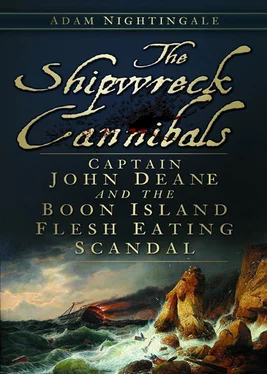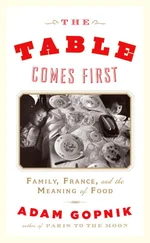All of the above is broadly true, although there is no mention of Boon Island. Having established a degree of historical credibility, Kingston immediately queers his own pitch by pointing readers to John Deane’s tombstone and then entirely inventing a couple of inscriptions on it: ‘His age, fourscore years and one,’ and, ‘After life’s fitful fever, he sleeps well.’ Kingston gets Deane’s wife’s name wrong, calling her Elizabeth. All of these errors could have been easily corrected by a quick look at the tombstone Kingston invokes. This mixture of fact and slip-shod inaccuracy establishes the tone for 415 pages of entertaining and outrageous nonsense.
The novel begins in 1696 with Rupert Harwood and his daughter Althea riding through Nottinghamshire on their way to visit the Deane family. Father and daughter are Jacobites. They discuss the Deane family, in particular the two brothers. Jasper is described as ‘a quiet, proper-behaved young man’. John is described as ‘a broad-shouldered lad […] not ill-fitted to fight his way through life’.
Father and daughter enter Nottingham where their passage is blocked by a mob baiting an ox. A lone man confronts the crowd. It is John Deane. The crowd nearly unhorse Althea. Rupert Harwood challenges the crowd, informing them that he is a justice of the peace. John Deane mitigates on the crowd’s behalf, suggesting that formal legal proceedings are unnecessary but that he would be more than happy to track down the ringleaders and thrash them.
The Deanes live in the market place in the centre of Nottingham. The Harwoods and the Deanes dine and converse. They talk about John Deane’s future prospects. John reveals:
I should like to see the world, but I have not a fancy for knocking men on the head, and could never understand the amusement some people find in it; but I have no objection to stand up and defend my own if I am attacked, or to draw my sword in the defence of a friend or a right cause.
This is John Deane’s philosophy of adventure that will be played out over the course of the rest of the novel.
We learn that Kingston’s Deane is comparatively uneducated but not stupid. He likes weapons. He loves fishing. He is enamoured of the Robin Hood stories and believes them wholesale. He virtually hero worships his monarch William of Orange. He is an expert storyteller. His favourite book is Foxe’s Book of Martyrs. At the beginning of the novel Kingston’s John Deane is a wild man tempered by a deep seam of decency and honour.
John Deane very quickly falls in love with Althea.
That evening Deane meets up with a gang of poachers that he runs with from time to time. Their plan is to steal fish. Deane’s feelings for Althea trouble his conscience and he announces to his gang that this will be his last poaching raid. The raid is interrupted by the presence of Mr Pearson, a mysterious gentleman from Yorkshire. Pearson convinces the gang to let him accompany them. Pearson claims to be a cattle dealer but displays greater skill at poaching than Deane and his compatriots. When the gang are discovered and are fired upon by game keepers it is Pearson who guides them to safety. Pearson reveals that he knows who John Deane is. He is impressed with Deane and offers him work as a soldier for an unspecified cause. Deane politely declines and goes on his way determined to be more law abiding in the future.
Deane makes the decision to confess to his father his part in the poaching raid but a fire on a neighbouring property arrests his intentions. Deane risks his life and fights the fire. He becomes a local hero. The owner of the property offers to give Deane a start in business as a reward. It transpires that for a while John Deane has wanted to become a drover of cattle in order to see more of Britain. Deane is set up as drover’s apprentice. As Deane is sent away on his first droving expedition he is advised by his cousin to trust in God, the first of many such endorsements by good, trustworthy Protestants throughout the novel.
Pearson and Rupert Harwood know one another. Both men are part of a plot to restore James II to the throne of England. It is Pearson and Harwood’s intention to tempt John Deane over to their cause.
John Deane’s adventures as a drover involve a trip to Stourbridge Fair, a dramatic run in with cattle thieves and an encounter with a Huguenot exile, expelled from France and separated from her husband and daughter. Deane experiences a string of encounters with Pearson, who criss-crosses his path. Deane is manipulated by Pearson into thinking that he is a wanted man for the poaching incident. Pearson convinces Deane that the safest place for him is either at Pearson’s side or among Pearson’s friends. Pearson sends Deane on numerous errands around the country. Deane hides out in the Fens and goes to London. He meets Elizabeth, Pearson’s stepdaughter, an attractive Protestant who begins to challenge Althea Harwood for Deane’s affections.
Without Deane fully realising it, Pearson gradually embroils and implicates him in a Jacobite plot to assassinate William of Orange. As the plot trundles on, Deane meets more prominent Jacobite conspirators and becomes more and more mired in the conspiracy. Just as the full horror of what Deane has become involved in dawns on him, the conspiracy is exposed and a retaliatory cull begins. Pearson slips away taking his wife and Elizabeth with him. Others are arrested and some are executed. John Deane manages to escape untainted but is burdened by guilt and feels the need to make amends. He enlists in the navy to prove his worth in military service and erase the shame of accidental treason.
It is about halfway through the novel. Up until this point W.H.G. Kingston has proved a fine storyteller. There are faults. The plot is stopped here and there for a history lesson better employed as a footnote. There are long-winded speeches. There are moments when normally shrewd villains are conveniently indiscreet whenever John Deane needs to overhear a crucial piece of information. But Kingston’s faults are kept in check by his precision and vivid economy of description, his fast-moving and wry action sequences and an occasional gift for dialogue, whether it is a terse exchange in the middle of a fight: ‘sheathe your blade, if you have not a fancy for having your brains blown out!’, or John Deane’s description of his own and his mount’s mutual exhaustion after a long journey: ‘I’m afraid if I were to ride on through the night with my tired steed, that we both of us should roll in the mud before day dawns.’ Kingston’s England is a wild, rambunctious, colourful and exciting place. Kingston’s John Deane is complicated, changeable, honourable and corruptible. Even the villains are human. Pearson is likeable and displays a fondness for Deane even as he is attempting to pollute him. Deane feels a similar ambivalence about Pearson and despite his outrage can never fully bring himself to completely hate or denounce him. Pearson and Deane’s relationship is reminiscent (perhaps to the point of plagiarism) of the reluctant friendship between the ideologically polarised fugitives Davey Balfour and Alan Breck Stuart in Robert Louis Stevenson’s superior novel Kidnapped . Yet, once Deane joins the navy, the story begins to drown in its own sanctimonious ridiculousness.
The rot doesn’t set in straight away. John Deane’s first few naval engagements against the French are described brilliantly. There is grotesque detail, grim incident and black comedy. A man standing next to Deane is blown apart. Deane is covered in blood. He examines the dead man, unsure how much of the blood is his and how much belongs to the atomised shipmate. A sailor reassures him: ‘See, that’s his blood which has turned you into a red Indian.’ It is a human moment laced with gallows humour. Deane is a cog in the machine. He is not yet a hero, merely an anonymous soldier playing his part in a glorious and awful event, observing the ways in which the seasoned and experienced deal with the appalling consequences of human behaviour. It is an incident worthy of the real John Deane. It is an anomaly in the writing of W.H.G. Kingston. From that point on the pace of the narrative accelerates. Deane goes from naval action to naval action. He rises through the ranks. He serves under some of the great admirals of the age. He wins their attention by being the first to volunteer for action. He boards a French galley and frees their slaves. He boards a privateer. He is given his first command. He dives into the ocean and rescues a drowning quartermaster who is about to be eaten by sharks. Deane’s courage and modesty wins the devotion of his crew.
Читать дальше












